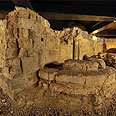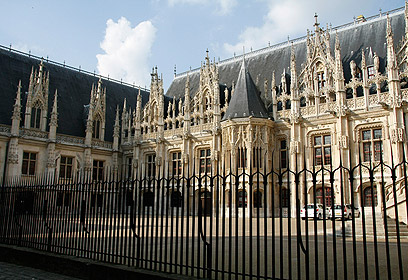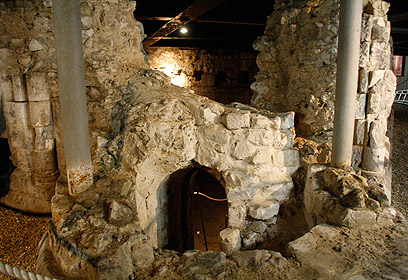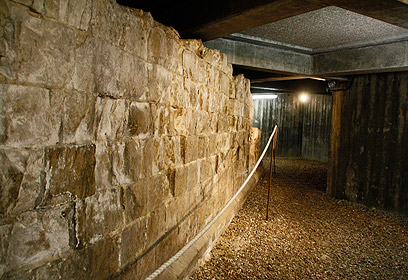
Even today, those who happen to reach the criminal ward, and not as one of the workers, can at least enjoy a colorful Renaissance ceiling.
About 40 years ago, archaeologists were surprised to discover under the building a historic structure dating back to 1100.

The Rouen courthouse (Photo: Gili Mazza)
The archeological find was only revealed to the wide audience in the past year. It appears to be a yeshiva from the Middle Ages – the only one in Europe whose remains have been preserved to this day.
Rouen residents are very proud of the yeshiva, referring to it as "the most important Jewish archeological find in Europe."
The structure discovered under the courthouse proves that about 1,000 years ago, Rouen had an intellectually and commercially active Jewish Quarter.
Two phrases in Hebrew were found inscribed on the internal wall of the underground building: May the Torah Reign forever" and "This house is supreme".

Torah studied here 1,000 years ago (Photo: Gili Mazza)
The second writing made the researchers assume that the structure was a house which belonged to one of the community's rich members, a theory which was only raised after a suggestion that it was a synagogue was contradicted due to the absence of a typical eastern wall.
When American researcher Norman Golb of Chicago University delved deeply into the matter, a new light was shed on the walls. Golb, an expert on Hebrew manuscript materials, studied the structure in its initial discovery stages and established the thesis that it was a yeshiva.
Not for claustrophobiacs
How did Jews maintain a community life under the firm hand of not so tolerant rulers, to say the least, and spread Torah from the city of Rouen across Europe? It is indeed a mystery.
The yeshiva's visiting hours are very limited. The site is open to visitors only on Tuesdays, and only at 3 pm. The reason is poor supply of oxygen and a serious humidity problem, which damages the writings on the walls.

Two writings in Hebrew found on the wall (Photo: Gili Mazza)
If you happen to suffer from claustrophobia, you may not like the fact that the guide locks the door after you and follows you underground.
The city of Rouen, the former capital of Normandy, also calls for a fascinating impressionistic tour (in the footsteps of Monet, Pissarro and Gauguin), but that goes beyond the Jewish story of the place.
To visit the site you must book in advance with the Rouen Seine Valley Tourist office. Additional information can be found on this website .
The writer was a guest of the Normandy Tourist Board and the Atout France in Israel company.
- Follow Ynetnews on Facebook















